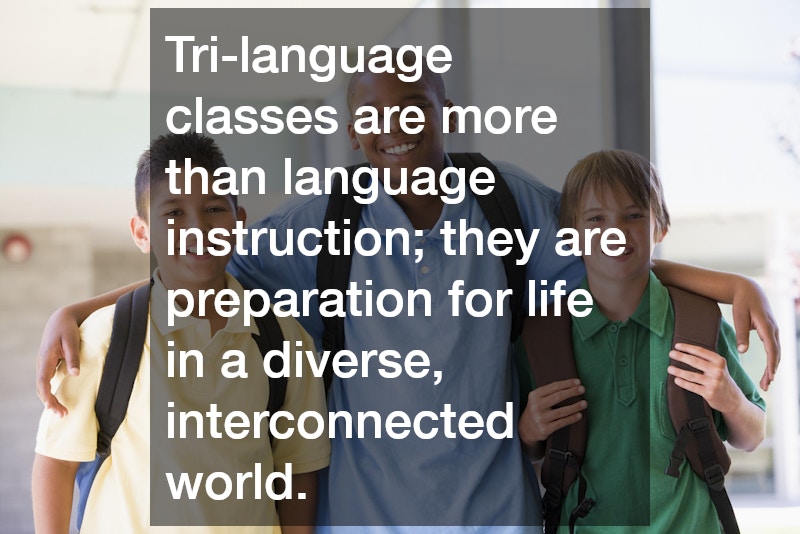
Singapore’s education system is renowned worldwide for its excellent standards, particularly in language learning. With the city-state’s multicultural environment, learning multiple languages is not just encouraged but is often essential. Notably, tri-language classes in Singapore have been gaining popularity, especially in private schools, to meet the demands of a globalized society and the multicultural fabric of Singaporean society.
The concept of tri-language classes involves students learning three different languages, typically English, Mandarin, and Malay or Tamil. These languages reflect Singapore’s most spoken languages, aligning with the country’s cultural diversity.
Private schools have been at the forefront of integrating these classes into their curriculums, recognizing the competitive advantage linguistic versatility gives their students in the modern world.
This innovative approach positions students to communicate effectively in multicultural environments, giving them a unique edge both locally and internationally. The educational focus on tri-language proficiency reflects Singapore’s emphasis on fostering cultural understanding and communication skills. As a result, these programs not only improve language skills but also nurture students’ appreciation for different cultures and global perspectives.
Benefits of Tri-Language Classes
Tri-language classes offer several cognitive benefits that can enhance a child’s educational experience significantly. Studies have shown that learning multiple languages boosts brain function and improves memory and problem-solving skills. Furthermore, these classes enhance a child’s ability to think critically and creatively, as understanding and switching between different languages requires significant mental agility.
Another significant advantage of tri-language education is its impact on cultural literacy. Through these classes, students gain a deeper appreciation and understanding of different cultures, fostering a more inclusive worldview. This cultural awareness is invaluable in today’s globalized world, where the ability to connect with people from diverse backgrounds is a prized skill.
Language classes are also vital in preparing students for the global job market. Employers highly value multilingual individuals for their ability to communicate with a broader range of clients and partners. Thus, students in Singapore private schools are not only learning languages; they are investing in their future careers where such skills can open doors to international opportunities.
Challenges of Implementing Tri-Language Classes
Despite the advantages, implementing tri-language classes in private schools can present certain challenges. One major challenge is the need for skilled educators who are proficient in all three languages and experienced in multilingual teaching methodologies. Recruiting such educators can be difficult, given the demand for their skills both locally and internationally.
Another challenge is ensuring equal emphasis and progress in each of the three languages. The varying levels of difficulty and students’ individual language backgrounds can make it challenging to maintain a balanced proficiency across all three languages. Schools need to develop customized curriculums and teaching materials that cater to the diverse needs of their student demographics.
Moreover, the rigorous nature of tri-language education can sometimes be overwhelming for students who may struggle with language acquisition. It is essential that schools provide additional support, such as tutoring and language labs, to help students who may need extra assistance. Balancing language education with other academic subjects also requires careful planning to avoid student burnout.
Successful Strategies in Tri-Language Education
To effectively overcome the challenges while maximizing benefits, schools employ various strategies for teaching tri-language classes. One successful strategy is integrating technology into language instruction. Interactive software and language apps can provide individualized learning experiences, making language acquisition more engaging and effective for students.
Another effective strategy is adopting a collaborative learning model, where students are encouraged to work in language groups. This peer-to-peer interaction not only improves language skills but also enhances soft skills such as teamwork and communication. Furthermore, immersion programs that include cultural exchanges and collaborations with international schools have been shown to deepen students’ language proficiency and cultural understanding.
Additionally, the use of motivational incentives and cultural events can enhance the language learning experience. Competitions, cultural festivals, and language days can make learning more enjoyable and provide practical applications of language skills. Such initiatives not only boost morale but also help reinforce the languages in real-world contexts, thereby solidifying students’ learning experiences.
Tri-language classes in Singapore private schools offer a robust framework for multilingual education, preparing students for a dynamic and interconnected world. The benefits of these classes are immense, from cognitive and cultural to professional advantages. While challenges exist, the application of innovative teaching methods and strategic planning can effectively mitigate these issues.
By investing in tri-language education, Singapore’s private schools are setting a global standard for multilingual proficiency. This approach not only places students at an advantage but also reflects the country’s commitment to cultural inclusivity and global readiness. As the world continues to globalize, such educational programs will remain pivotal in shaping the future generation’s communication skills and cultural competence.
Overall, tri-language classes are more than language instruction; they are preparation for life in a diverse, interconnected world. Singapore’s private schools are leading this charge, creating a template that other educational systems worldwide would do well to emulate. As the demand for multilingual proficiency grows, these innovative classes ensure that Singapore remains at the forefront of global education.
.



